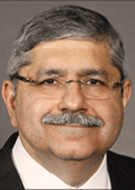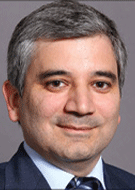RSNA Expands Global Presence with Education Outreach
International programming builds worldwide radiology network with focus on education and collaboration


Almost since its founding, RSNA’s international outreach has belied its name, ensuring that radiologists throughout the world are skilled and empowered to provide the best patient care possible.
As international membership grows and technology and social media make the world seem smaller, RSNA continues to expand its global footprint by creating programming that meets the diverse needs of radiologists around the world and fosters relationships with regional radiology associations.
“RSNA is fundamentally both a North American and a global organization at the same time,” said Umar Mahmood, MD, PhD, RSNA Board liaison for international affairs. “As the world has gotten flatter over the last quarter century, visionary leaders of RSNA realized this opportunity and have continuously taken advantage of the latest technologies and methods to improve our international outreach. RSNA has made a concerted effort to both bring in radiologists from every part of the world who want to advance the field, as well as improve radiology training around the world.”
As the leading radiology organization globally, RSNA recognizes the Society’s role in aiding low-resource countries in maximizing their ability to develop the best education and training possible. These outreach initiatives have been ongoing for the last few decades and continue to expand, said Dr. Mahmood, vice chair for precision imaging in the Department of Radiology at Massachusetts General Hospital (MGH) and a professor of radiology at Harvard Medical School in Boston.
While international attendance at the RSNA annual meeting remains healthy (nearly 10,000 participants from outside North America attended RSNA 2019), it is equally important for RSNA to have a physical presence throughout the world, especially in middle- to low-resource countries. Whether that means offering educational seminars and hands-on workshops, or more recently, equipment and technical assistance, RSNA continues to enhance its role as a worldwide leader in radiology.
“RSNA has devoted a significant amount of effort and resources to extend knowledge and continuous education in low- and middle-income countries and identify and mentor individuals and institutions worldwide who will be the new generation of academics in radiology,” said Claudio Silva, MD, MSc, chair of the RSNA Committee on International Radiology Education (CIRE) and an associate professor and vice chair of academic affairs in the Department of Radiology at Clínica Alemana de Santiago, Santiago, Chile.
Spotlight on Education
RSNA began hosting Spotlight Courses in cities around the world in 2016. The first course was held in Cancun, Mexico, and more recent courses were held in Santiago, Chile; Paris, France; and Sao Paulo, Brazil. Each Spotlight Course is designed to focus on a specific medical imaging topic.
Global experts share the responsibility for developing the program and selecting faculty. Through lectures, hands-on activities and Diagnosis Live™ quizzes, the courses take a deep dive into the topics that are tailored to meet the needs of the audience. A global faculty ensures that attendees experience a wide range of perspectives and receive comprehensive information and advice that can immediately be put to use.
For courses held outside of the U.S. or Canada, the entire program is often delivered in the region’s native language. Four Spotlight Courses have been delivered in Spanish and the most recent course on cancer imaging was conducted in Portuguese.
RSNA works with the local or national radiology society, when possible, to identify faculty and topic areas of interest.
“The Spotlight Courses are an ingenious solution for radiologists who have difficulty traveling to the annual meeting in Chicago. The courses bring the quality of RSNA education with expert lecturers to regions around the world,” Dr. Mahmood said. Spotlight Courses are planned for 2020 in Italy, the United Kingdom, Argentina, Singapore and the U.S.
Global Learning Initiative
In 2019, RSNA announced its latest global initiative — Global Learning Centers (GLC). Designed to expand radiology education around the world, RSNA is partnering with established radiology departments based in low- or middle-income countries to create a GLC and improve radiology departments through education.
A group of RSNA volunteers will work as a team with the radiology department at each GLC over a three-year period. The RSNA team will include up to four RSNA volunteers to serve a one-year term. One of the volunteers will be appointed as RSNA Program Director, who will serve a term of three years.
RSNA team members will travel to the GLC twice a year to develop a customized educational plan including a curriculum with hands-on training, didactic lectures (virtual and in-person), conferences, online courses through the RSNA Online Learning Center and other educational offerings. Physical classrooms will be set up for program participants at the GLC to engage in virtual learning and interact with the RSNA team members. Based on identified needs, funds will also be available for the purchase and repair of radiology equipment.
The contributions of volunteers are immeasurable, Dr. Mahmood said.
“Our volunteers profoundly enhance the ability of radiologists in low-resource countries to provide excellent care,” Dr. Mahmood said. “We all went into medicine to help people, and these international opportunities are a meaningful way to give back and utilize our training to improve the medical care of patients in areas with fewer resources.”
Stellenbosch University in South Africa was recently announced as the first GLC.
“The Global Learning Centers will be the natural expansion of RSNA international programming, allowing RSNA professors and local radiologists to engage in a three-year relationship that will build longer-lasting bonds, assess the impact of educational efforts and provide the GLC access to all the opportunities RSNA has for radiologists,” Dr. Silva said. “It will allow RSNA to measure how effective our interventions are and which are the ones that yield the best results.”
Junior faculty at the GLC will be selected as a Derek Harwood-Nash International Fellow, another RSNA program that allows academic radiologists with between three and 10 years of experience to spend up to 12 weeks in the U.S. visiting an academic institution in a specific division of interest. This combination of the international fellowship program and the GLC provides a unique approach to global learning and outreach, Dr. Silva said.
“Having the opportunity to interact with academic radiology groups from around the globe helps make RSNA a more substantial, stronger, and more knowledgeable radiology society and provide, by these means, better patient care for all,” Dr. Silva said.
Networking Cross Culturally
To enhance relationships between RSNA and radiology associations around the world, RSNA members attend and speak at various scientific meetings and assemblies throughout the year. RSNA often has a booth highlighting member benefits including the Online Learning Center, Virtual Meeting and RSNA journals, and registers new members onsite.
RSNA Announces Inaugural Global Learning Center
In December, the RSNA Committee on International Radiology Education (CIRE) announced the inaugural RSNA Global Learning Center (GLC) located at Stellenbosch University in South Africa.
“Stellenbosch University is honored to be selected as the first RSNA Global Learning Center,” said Leon J. van Rensburg, MBBCh, MMed, DSc, professor at Stellenbosch University and co-host director for the GLC. “We hope that the work we do with RSNA will be a model for the development of education programming that can be implemented around the world to benefit patient care.”
“At Stellenbosch University we strive to seamlessly integrate clinical service, teaching, research and medical administration. The teaching and mentorship of the RSNA GLC will thus play out in every aspect of our departmental activities,” said Richard Pitcher, MBChB, PhD, professor and executive head, Department of Medical Imaging and Clinical Oncology, chief specialist and head of Division of Radiodiagnosis at Stellenbosch University and co-host director. “Patient care will potentially be enhanced on multiple levels, through new and improved imaging protocols, increased accuracy of radiological reporting, more substantive radiologist contributions to multidisciplinary clinical meeting and improved patient outcomes.”
For more information about the Stellenbosch University GLC, visit RSNA.org/News. RSNA News will feature a story on Stellenbosch University GLC in a future issue.